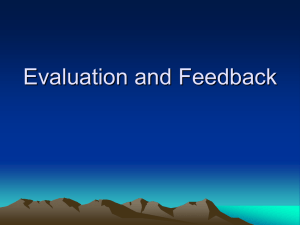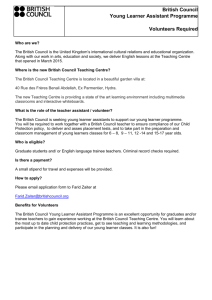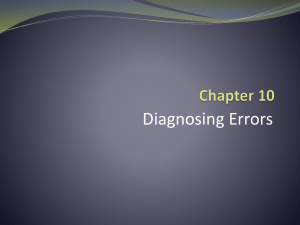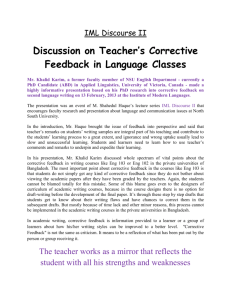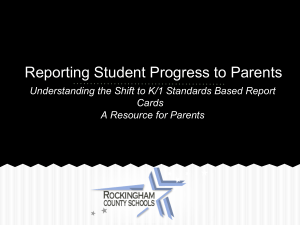Document
advertisement
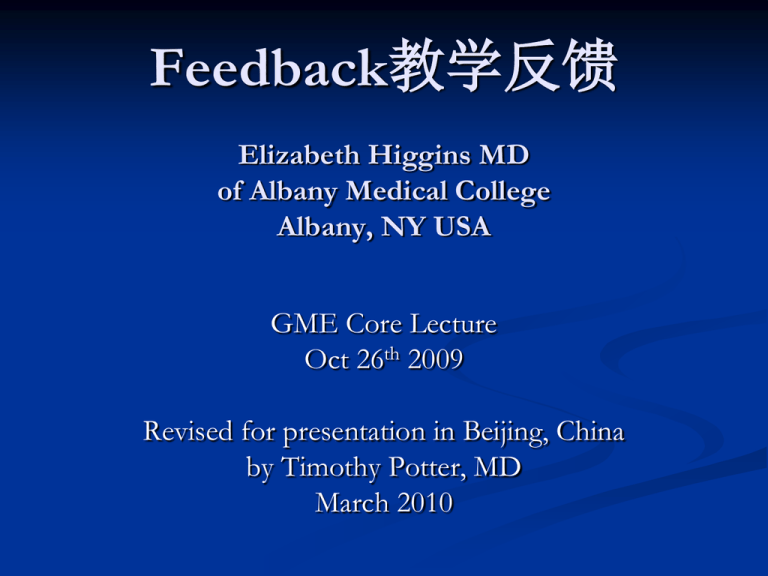
Feedback教学反馈 Elizabeth Higgins MD of Albany Medical College Albany, NY USA GME Core Lecture Oct 26th 2009 Revised for presentation in Beijing, China by Timothy Potter, MD March 2010 Goals 目标 Recognize the importance of feedback to the educational process认识反馈对教育过程的重要性 Learn the art of speaking objectively and precisely in giving feedback学习在给出反馈时客观且精确地叙述 的艺术性 Demonstrate appropriate corrective feedback演示恰当 的、有纠正作用的反馈 Feedback反馈 The MOST effective tool for change带来改 变的最有效工具 “Corrective” and “reinforcing”纠正作用 和强化作用 First things First!首要事情中的首要! What’s the GOAL ? 目标是什么? Align Goals:排列目标: Helping the resident understand the difference between feedback and evaluation … never confuse the two 帮助住院医师理解反馈和 评估之间的不同 …永远不要混淆这两个 (evaluation is when the train comes!) (评估是当列车来的时候!) How do we get to the Goal? Effective Feedback! 我们怎样达到目标?有效的反馈! Resistance 阻力 Barriers障碍 Must be done!一定要做! What are the potential consequences of providing no feedback?没有反馈的 可能后果是什么? What are the potential consequences of providing the wrong kind of feedback? 错误反馈的可能后果是什么? Perspective期望 Put yourself in their shoes…把 你自己的脚放进他们的鞋 里试一试 Can you “feel” the perspective of your learner? 你能“感 觉到”你的学习者的期望 吗? Could you describe it back to them? 你能描述出学习者 的期望并对他们说出来吗? Feedback Tools and Tips-How 反馈工具和诀窍-如何 You are not God … so …你不是上 帝…因此… Use Self-evaluation too (360degree evaluation)也要使用自我 评估(360度评估) Use words like “feel, felt, found” that acknowledge that this is your perspective, not an absolute verdict 使用像“感觉、感到、发现” 这样的词语,这些词语表明这 是你的期望,不是一个绝对的 决定 “I” message vs “You” message“我”信息及 “你”信息 Feedback Tools and Tips-How反馈 工具和诀窍-如何做 Your residents are human, so … 你的住院医师 是人,因此… Small doses小剂量 Frequent doses … something we should all get used to重复给药…我们都应当熟悉 How … 如何做 address behaviors, not personalities 处理的是行为,不是性格 How …如何 做 With emotions under control控制情绪 How …如何做 With your goals aligned with those of the learner: “I’ve noticed something that might help you become an even better doctor …”你的目标和学习者的目标结合:“我已 经注意到通过哪些改变可能帮助你成为更好医生…” Without going through a third party (so the feedback is based on first-hand data, observed by the one giving it)不通过第三 方(因此反馈是建立在第一手数据上,是给出数据的 那个人所观察到的。) Without generalizing (as in, “you always …”) … instead refer to a specific incident不要概括(如:”你总是…”) …而是 谈到具体事情 Without assuming motives, mentioning only actions and decisions 不要猜测动机,而只提到行动和决定 How: 如何做 Avoid “education through shame” 避免“通过羞辱来教育” Avoid “education through shame” 避免“通过羞辱来教育” Feedback that fails is feedback usually fails by leading to anger, defensiveness, or embarrassment on the part of the trainee失败 的反馈:导致受训者愤怒、产生自我保护心理或窘迫的反 馈通常会失败。 How well do you process information and your strong emotions at the same time? 你如何很好地同时处理信息和你的强烈的 情绪? Hierarchy / authority remains, but since this is feedback not evaluation, establish that you and the trainee are ALLIES, as you work together to help the trainee learn. 等级/权威仍要保持, 但是既然这是反馈而不是评估,明确你和受训者是同盟, 你们一起工作来帮助受训者学习。 Feedback works best when solicited, not imposed当反馈是请求 而不是强加时最有效。 How: verify that the information intended has been received 如何做:证实预发射的信息已经被收到 Avoid stroking the person’s ego 避免打击人的自尊 Again, it’s the behavior, not the person, we are praising再次强调:我们称赞的是行为,不 是人。 Direct praise of the person can be embarrassing, addictive, and not very helpful对人的直接称赞 会令人尴尬、成瘾,没有多大帮助。 Feedback反馈 What什么内容 The behavior, not the learner – we are watching for specific actions we would like the learner to change行为,不是学习 者-我们观察想让学习者改变的那些特定的行动。 The learner is a human, a unique, valuable person, designed, full of potential, better at some things than you are … it is not our job to change who they are, but it is our job to change (some of) what they do学习者是人,独特的、有价 值的人,是被设计的、充满潜能的,在某些方面比你 更好… 改变他们是谁不是我们的工作,改变他们所做 的(某些方面)才是我们的工作。 Where?哪里? Private vs. public个人对 公众 Comfortable environment舒服的环 境 Quiet space安静的空间 Feedback-When反馈-什么时候 Timing is everything!时机就是 一切! Close to critical event接近紧急 事件 Frequent and ongoing常常和持 续 Feedback-What反馈-什么 Observed behavior观察到的行为 Specific not general具体而不是概括 Use nouns and verbs使用名词和动词 Limit to one or two things限制到一或两件事 情 Address goals (form/teaching script)写下目标 (形式/教案) Only things that CAN change只是能改变的事 情 “There are no bad students…. only bad teachers”“没有不好的 学生….只有不好的老 师” Is your trainee an Ugly Duckling?... 你的受训者是丑小鸭吗?... If so …如果是... Perhaps help them alter their goals 也许要帮助他们改变他们的目标 …and not the process by which they try to meet the goals they already have. …不是那个他们试 图达到他们已有的目标的过程。 How如何做 I message我信息 Use Nouns and Verbs 使用名词和动词 Avoid adjectives避免形容词 No sarcasm不要讽刺 Higher Authority较高的权威 Feel, felt, found感觉、感到、发现 Summary摘要 Feedback and Goals反馈和目标 Tools for giving Feedback给出反馈的工具 Connoisseurs of Feedback !反馈的鉴定家! You Try!你来试一试! Partners同伴 Real life situation真实生活情景 Corrective Feedback有纠正作用的反馈 Do it well做好 Short (2 minutes)简短(2分钟) Does this lecture feel like “feedback” for you? 对你来说,这个讲座是不是感觉像“反馈”? … or perhaps I need some feedback in my feedbackteaching skills! …或者也许我的反馈技巧教学 也需要一些反馈! “Like giving feedback, receiving it properly is not always a simple passive act. It requires maturity, honesty, and selfless commitment to the goal of improving clinical skills … traits that are certainly worth cultivating in our future physicians.” “就像给出反馈一样,恰当地接 受反馈不总是简单的被动活动。这要求成熟、诚 实和对改善临床技巧的目标有不自私的责任---的 确值得对我们未来的医生进行培养的品质。” WE ARE ALL STILL LEARNING! (that is how we know we’re alive !!)我们都是 在一直学习!(那就是我们如何知道我们还活着!!) Sources:资源 http://www.im.org/Publications/Insight/Archi ves/Documents/Vol4Issue4/Best_practicesfeedback.pdf Ende J. Feedback in clinical medical education. JAMA. 1983; 250 (6): 777-781.


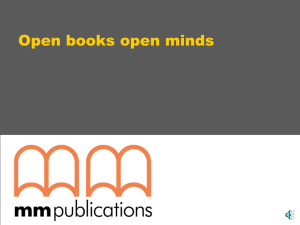
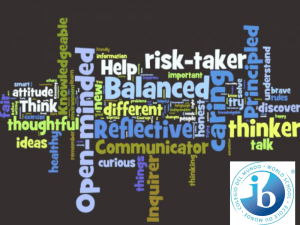
![Importance & Skills of Giving Feedbac[PPT]](http://s2.studylib.net/store/data/010033289_1-a4b64e5001f869e4666085b15166a5e6-300x300.png)
